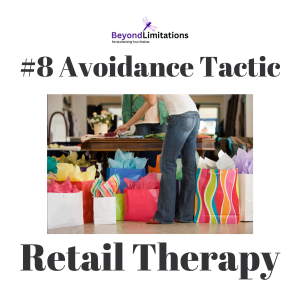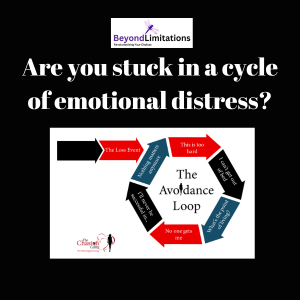
Coping strategies are psychological patterns that individuals use to manage thoughts, feelings and actions encountered during any loss event.
Many times, in life we have developed unconscious habits that are not serving us. To change a habit, we must first be aware of it.
Which of these three coping strategies is your default strategy?
ACTIVE
During this phase, we are actively gathering information, securing social support, prioritising tasks, active distraction and problem-solving. The title graphic above where the lady is, highlights what this strategy (and the next two strategies) is all about ~ for you to say I’m ACTing in a conscious way.
The good news is that WE LOVE to assist you to have a detailed step-by-step guide on how you can ACTively move beyond all of your losses. Even the ones that you may have stuffed so deep down, you have consciously forgotten about them!
PASSIVE
During this phase, we are purposefully engaging in activities being distracted by others, in order to not have to think about the event.
Whilst this strategy may initially seem effective in dealing with particularly intense feelings and may serve to decrease distress, in the long term if you stay in this for too long it is like you are saying you’ve PASSed on life.
We are here to embrace all of life’s events, to learn and grow from them not to pass on them.
Take the time now, to imagine that you are ninety years old, sitting in your rocking chair reviewing your life and all that has happened. When you reflect back to the present day and you think back to reading this book and that you ignored all or most of its advice, just because it was easier for you to just PASS on life.
- Would you have any regrets?
- Would you be angry at yourself for never fulfilling all your hopes, dreams and aspirations?
- In hindsight, does it make logical sense that you decided to stop living and pass on life because you had a really horrific loss occur in your life, that you felt you would never get over?
AVOIDANCE
During this phase, our behavioural, cognitive, or emotional activity directs us away from a perceived threat (e.g., denial, withdrawal).
This strategy seems to be a default one for many. Early on we may learn to cover up, hide or bury our feelings. Then not surprisingly sometime later we adopt that same behaviour and bury our feelings – utilising alcohol or other less ideal habits.
Begging you to ask, “Am I DANCING with the devil or DANCING to the music within me?”
Our next few posts will shine the light on avoidance tactics.
Though for now here are some:
Contemplations for YOU to Ponder:
- My default coping strategy is?
- How has that been working out for me?
- Moving forward what would be a better strategy?
- How would this new strategy enhance my life, moving forward?
Take some time to write these down. Explore them. Then forgive yourself for not knowing there was a better strategy you could have been utilising.
That way you can learn and grow, knowing that next time loss comes into your lufe you’ll have a better stratgey to utilise.
Until we meet again, please remember that you are Simply the BEST!
Karen and Lesley
#CopingStrategies #HabitAwareness #DefaultStrategy #LifeReflection #BetterStrategy #BeyondLimitations










